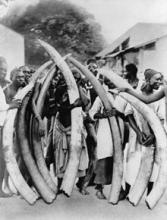It never fails to amaze me what people do to animals for the sake of status or a feeling of superiority. My mother once told me of a coworker who paid lots of money to go on a “safari” in Africa where she was able to shoot an enclosed giraffe and have it made into a handbag or something for herself. This is gross to me in so many ways. Not only would the woman not have been able to do such a thing on her own in the actual wild (where a lion pride, perhaps waiting for the giraffe, might have made a tasty snack out of her mealy bones), she also disregarded this huge, amazing creature’s life as if it were a thing and not a living being.
This is what’s happening with the poaching and animal trade business. These animals—many of which are in danger of becoming extinct within our lifetimes—are treated as if they are commodities to be bartered and sold, kept as trophies to satisfy some kind of sadistic human mindset that living beings provide a status symbol. A gorilla’s hand looks an awful lot like our own, for good reason—would they similarly mount a child’s hand for an ashtray as well? With such bloodlust, greed, and disregard for life at all fueling these actions, it would certainly not surprise me. I think the horror stories about people kidnapping other people to use them for hunting chases and killing them are not strictly out of fantasy; perhaps there is some truth to them—if not in action, then definitely in the sentiment.
Not surprisingly, countries are also reluctant to enforce stricter laws against the trade over the Internet because they fear launching poor communities into further poverty. The funny thing is, it’s usually poachers, not communities, who benefit from these sales—at least from what I’ve heard—and I sincerely doubt the money is shared. If we want to support these communities, perhaps we can provide education, training, farming aid, and more assistance rather than simply letting so many threatened species die due to someone’s greed.
